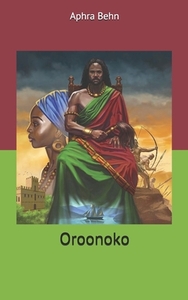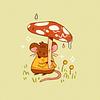Take a photo of a barcode or cover
adventurous
dark
informative
sad
tense
medium-paced
Plot or Character Driven:
A mix
Strong character development:
Complicated
Loveable characters:
Complicated
Diverse cast of characters:
Yes
Flaws of characters a main focus:
No
Graphic: Racism, Self harm, Violence
dark
emotional
tense
slow-paced
Plot or Character Driven:
Plot
Strong character development:
No
Loveable characters:
No
Diverse cast of characters:
Yes
Flaws of characters a main focus:
No
My full review on BookNest - BookNest - Oroonoko
Virginia Woolf said Oroonoko was the first novel. What makes the context of this story even more remarkable is that if we agree with this, then the first novelist was a woman, written in the late 17th century.
“A poet is a painter in his way, he draws to the life, but in another kind; we draw the nobler part, the soul and the mind; the pictures of the pen shall outlast those of the pencil, and even worlds themselves.”
It is a story told in an almost biographical manner about Prince Oroonoko, who lived in the Caribbean Islands, and whom the author was in awe of. Behn forms his character with a sense of realism despite his idealised nature. He is the symbol of honour and deserves respect of all. But unto this he is stripped of his rank and taken as a slave. Yet he maintains his integrity and the impression of his personality on all he meets.
A particular favourite aspect of mine in this read was the romantic thread, which I do not often say. Unlike so many stories I have read, it appeared natural, despite also being idealised The way Behn implemented this into the story gave the story a humanity that was needed for a connection to be made with Oroonoko.
The prose of Behn does not focus on emotive language, but rather tells the story of what is happening in a factual, fluid and immersive manner, which cleverly presented the setting and culture and characters of all parties so effectively.
But, Oroonoko is a product of its time, especially with the topic of colonialism. Behn appears to show two opinions on slavery. By having slavery as the means in which Oroonoko is tragically stripped from his power, It is projected as barbarous and a tool of injustice, but paradoxically Behn shows support by depicting its importance in sustaining the British Empire that is heralded as a great ideal.
“Where there is no novelty, there can be no curiosity"
The fact that Oroonoko was inspired largely by true facts and then idealised and romanticised added an extra does of realism into this novel, but also made it even more interesting. In this multifaceted novel, we are introduced to an inspiring and evocative story, memorable characters of both a loveable and hatable disposition, and the fluid prose of Aphra Behn. A short, thought-provoking read.
4.5/5 STARS
Virginia Woolf said Oroonoko was the first novel. What makes the context of this story even more remarkable is that if we agree with this, then the first novelist was a woman, written in the late 17th century.
“A poet is a painter in his way, he draws to the life, but in another kind; we draw the nobler part, the soul and the mind; the pictures of the pen shall outlast those of the pencil, and even worlds themselves.”
It is a story told in an almost biographical manner about Prince Oroonoko, who lived in the Caribbean Islands, and whom the author was in awe of. Behn forms his character with a sense of realism despite his idealised nature. He is the symbol of honour and deserves respect of all. But unto this he is stripped of his rank and taken as a slave. Yet he maintains his integrity and the impression of his personality on all he meets.
A particular favourite aspect of mine in this read was the romantic thread, which I do not often say. Unlike so many stories I have read, it appeared natural, despite also being idealised The way Behn implemented this into the story gave the story a humanity that was needed for a connection to be made with Oroonoko.
The prose of Behn does not focus on emotive language, but rather tells the story of what is happening in a factual, fluid and immersive manner, which cleverly presented the setting and culture and characters of all parties so effectively.
But, Oroonoko is a product of its time, especially with the topic of colonialism. Behn appears to show two opinions on slavery. By having slavery as the means in which Oroonoko is tragically stripped from his power, It is projected as barbarous and a tool of injustice, but paradoxically Behn shows support by depicting its importance in sustaining the British Empire that is heralded as a great ideal.
“Where there is no novelty, there can be no curiosity"
The fact that Oroonoko was inspired largely by true facts and then idealised and romanticised added an extra does of realism into this novel, but also made it even more interesting. In this multifaceted novel, we are introduced to an inspiring and evocative story, memorable characters of both a loveable and hatable disposition, and the fluid prose of Aphra Behn. A short, thought-provoking read.
4.5/5 STARS
emotional
tense
medium-paced
Plot or Character Driven:
A mix
Strong character development:
No
Loveable characters:
Complicated
Diverse cast of characters:
Yes
Flaws of characters a main focus:
N/A
I wish the main publishers of classics would put an introduction with contextual notes at the front and then the analysis of the text at the back. Instead they blend the two and if you read the introduction before the story it gives away too much, if you read it after then you find you need to go back and read again for it to enhance the text.
The story itself is well written and the ending is such that as you close the book you need to take a few moments to reflect. It was a good read.
The story itself is well written and the ending is such that as you close the book you need to take a few moments to reflect. It was a good read.
challenging
dark
emotional
medium-paced
Plot or Character Driven:
A mix
Strong character development:
No
Loveable characters:
Complicated
Diverse cast of characters:
Yes
Flaws of characters a main focus:
No
challenging
dark
sad
tense
slow-paced
Plot or Character Driven:
Character
Strong character development:
No
Loveable characters:
Complicated
Diverse cast of characters:
No
Flaws of characters a main focus:
No
I definitely did not like this book. I had to read it for an English class "Literature to Jane Austen" of all things. I do not yet understand my professor's purpose in assigning this book, but if the only reason was because Aphra Behn was a published female author before Jane Austen, then this novel was a waste of time. I found the writing to be difficult, not because of age, but because of skill. The novel was blatantly grotesque, both sexually and violently. While the story-line had potential, it was overshadowed by side characters who were not that important.
adventurous
challenging
slow-paced
Plot or Character Driven:
A mix
Strong character development:
Yes
Loveable characters:
Complicated
Diverse cast of characters:
Yes
Flaws of characters a main focus:
Complicated
challenging
dark
emotional
reflective
tense
fast-paced
Plot or Character Driven:
Character
Strong character development:
Complicated
Loveable characters:
No
Diverse cast of characters:
Complicated
Flaws of characters a main focus:
No






